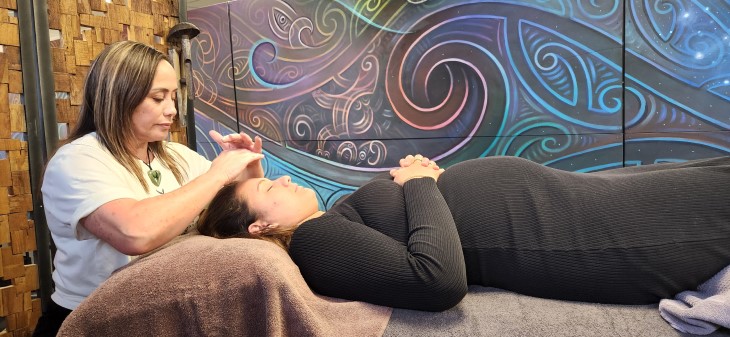Melissa’s story: The impact of a maternal birth injury
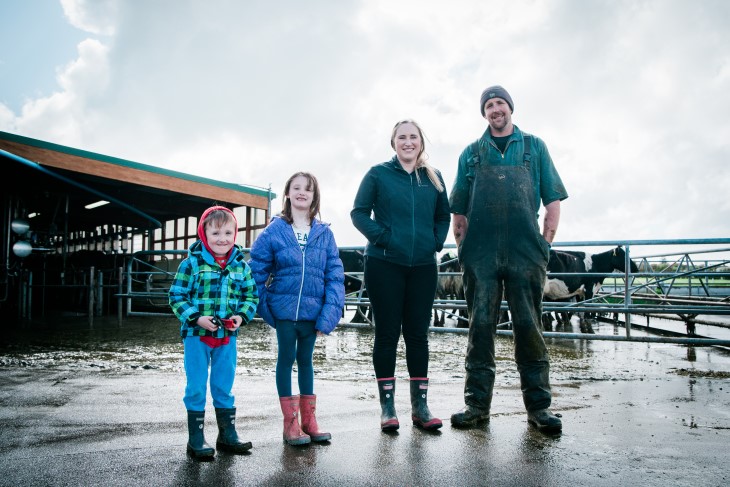
Taranaki mother of two says her birth injury had a huge effect on her life. She says the change in ACC legislation to cover maternal birth injuries is “amazing” for women around Aotearoa.
It took Melissa Smith seven months to build up the courage to say she needed help.
The mother-of-two experienced a birth injury with her daughter Charleigh in 2016.
She suffered a bladder and bowel prolapse in her first birth. It affected her physically, mentally and emotionally. It was a painful and lonely experience.
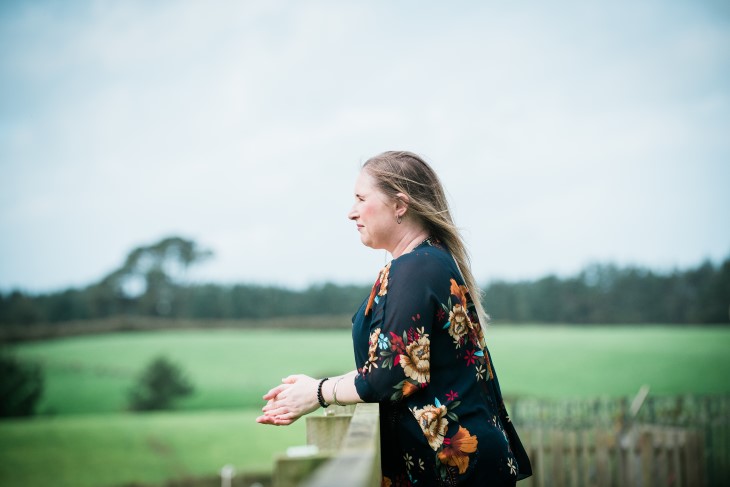
It took Melissa Smith seven months to be able to talk about her injury. Photo credit: Julia Sabugosa.
At the time, Melissa didn’t want to talk about her pain and struggles. She just wanted it to be over.
“It wasn’t until Charleigh was seven months old when I first came to the realisation and I actually spoke it out loud,” says the 36-year-old from Stratford.
“I said to my sister ‘I think I need some help’. It took me a long time to build up the courage."
Creating change for the next generation
Melissa is sharing her story to help other māmā/birthing parents around Aotearoa.
Her family are dairy farmers. Since her birth experience, Melissa has become a healing birth practitioner. She helps parents who have been through a traumatic birth experience.
“What I went through six years ago shouldn’t have happened. I really struggled to get support. I wanted to be part of changing that.”
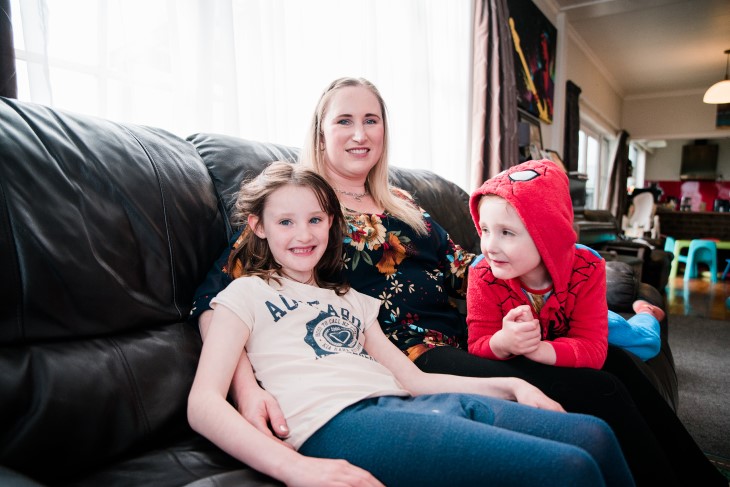
Melissa Smith with her daughter Charleigh and son Connor. Photo credit: Julia Sabugosa.
That change is happening.
From 1 October māmā / birthing parents who experience an injury during labour or childbirth will be eligible for support from ACC.
A change in the law means that ACC can now cover specific injuries birthing parents experience from the beginning of labour through to delivery of the pēpi (baby).
ACC can also help if birthing parents have other mental or physical injuries that are caused by a covered birth injury.
Those who give birth on or after 1 October 2022, and who have a covered maternal birth injury, can access the appropriate support, treatment, and care through the Accident Compensation Scheme to help their recovery and return to independence.
Melissa says it’s a huge moment.
“I’ve been quite vocal about this, but I’ve never done this for me,” she says.
“This is for our future. I’m doing this for my daughter, for my nieces. Women in New Zealand now know that they have protection and support. It’s helping the future, which is amazing.”
A significant change to the legislation
“This is the biggest legislative change to the Accident Compensation scheme for many years,” says Megan Main, the ACC Chief Executive.
“It is a positive step forward for us and for Aotearoa. But more importantly, it will make a huge difference to thousands of birthing parents and their whānau every year, while helping to improve equity of access to ACC for women.”
Our modelling indicates up to 80 percent of birthing parents will experience an injury during labour or delivery.
Megan Main, ACC Chief Executive.
Many of these will be resolved with standard maternity care or require low-level support. Some will require more significant treatment and care.
Maternal birth injuries have not been covered under the AC Scheme before because they did not fit the current definition of an ‘accident’ in the Accident Compensation Act 2001.
Following an amendment to the law, an ‘accident’ now includes force or resistance internal to the human body at any time from the onset of labour to the completion of delivery.
Megan is pleased to see this change, saying it’s “the right thing to do” for birthing parents.
“The birth of a baby is a life-changing moment, but it can also lead to injuries which have long-lasting effects,” she says.
Although the impacts of these injuries can be significant, Megan says the recognition, care and support available can vary.
“Extending our cover to maternal birth injuries means injured birthing parents and whānau can access the care and support they need earlier,” she says.
“This gets them on the path to recovery quicker and lessens the chances and impact of related injuries in future.”
“It was really overwhelming”
After her daughter’s birth Melissa was in the high-dependency unit (HDU) at New Plymouth Hospital for two nights. She stayed a further three nights in the Maternity Ward.
“It was pretty full on,” she says.
In the HDU Mellissa was connected to machines, heart monitors and she had drips in both arms. Just trying to hold her new-born was a challenge.
“I’d try to breastfeed Charleigh but I was struggling to hold her. It didn't work so it was really overwhelming.”
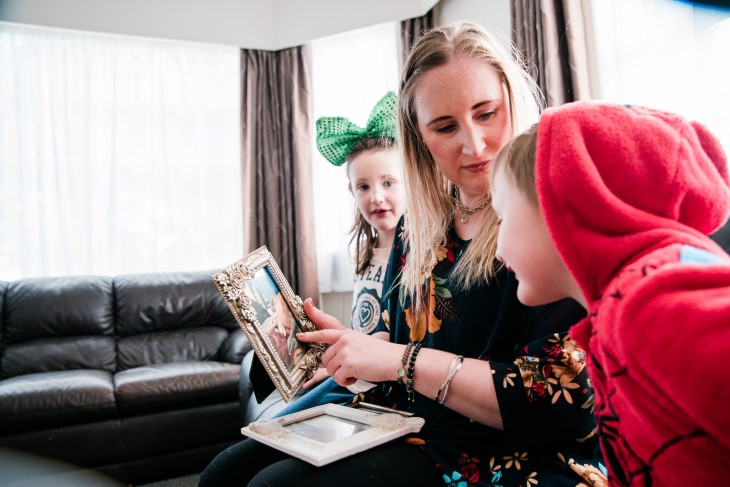
Melissa Smith looking back on the time when her children were born. Photo credit: Julia Sabugosa.
She says the support from the medical team at New Plymouth Hospital was incredible.
Going home was a different story.
Away from the specialist care of hospital staff, Melissa felt alone and isolated.
Melissa remembers being in unbearable pain. She was struggling to walk around the house, but she did her best for her daughter.
“You've got this baby now – and my focus was to keep this baby alive so I just buried the pain.”
Melissa says a lot of the pain and trauma of what she went through resurfaced many months later.
“I just put everything into Charlie. There were six to eight weeks where no bond was formed with her because I was in so much trauma… That’s really hard.”
A lifelong impact
Melissa says her injury affected her ability to work. She was no longer able to lift anything heavy.
“Even just playing with the kids, bouncing on the tramp, I’ve got to sort of think about that a lot more. As the babies get older, they get heavy. So, it's taken a long time to build up that strength.”
Melissa says it was tough to think about getting pregnant again.
She overcame those challenges and had her son Connor in 2019.
“Once I got pregnant again, a lot of those emotions came back up because I hadn't dealt with anything at all,” she says.
“I wasn't able to work for most of my pregnancy because of my injuries. It's a lot of retraining myself to just stop and think about what you’ve got to do. It's been very frustrating.”
Melissa says her birth injury took a huge toll on her mental health.
“Even six years on, there are still parts that will still come up out of the blue. I'm still affected by the prolapse. That’s for life now.”
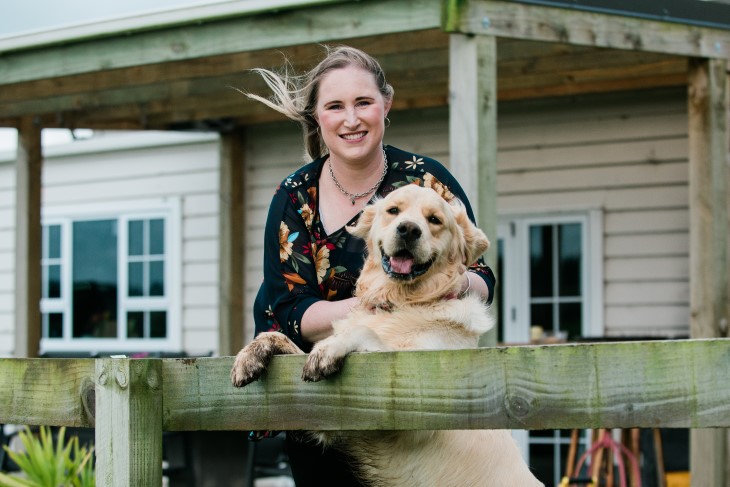
Melissa Smith and their family dog Pedro on their farm. Photo credit: Julia Sabugosa.
Advice for other mums
Melissa is pleased other mums won’t have to go through what she endured.
Her advice to other mums is to not hide their birth injuries.
“The more that you talk, the better it is,” she says. “Get it off your chest, go and talk to other mums.”
Melissa recommends māmā/birthing parents journal how they are feeling so they are not dwelling on the pain.
“There’s a snowball effect, once you start talking about it then you realise that I’m not alone and you can get through it together.
“And of course, the change in legislation and support is going to make a world of difference.”
Find out more about ACC support for maternal birth injuries:





